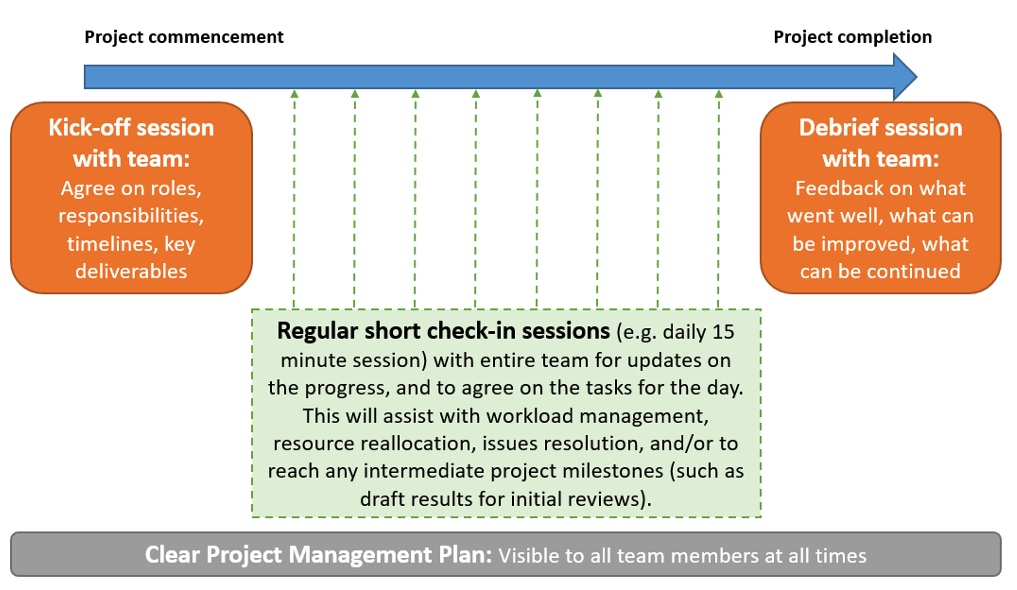
Challenges on Managing Teams Remotely and Tips to Address this Effectively
Although the economic and social challenges from COVID-19 are well behind us, societal changes that emerged during the pandemic still remain – some of which seemingly indefinitely.
One change is the continuation of remote working in the workforce. According to The Melbourne Institute July 2023 survey “Taking the Pulse of the Nation” (TTPN):
- Approximately 60% of employees desired to work from home either fully or more than half time and
- Approximately 50% of employers have permitted such arrangements.
While there remains a sizeable gap between the number of hours of remote working desired by employees and employers, it is perceivable that a hybrid model will be an acceptable option for both employers and employees in the future.
As the nature of the actuarial work generally requires significant amount of collaboration, there are several challenges for both existing and aspiring actuarial managers in managing their teams effectively under these conditions.
What are the common challenges of managing teams remotely?
1) Striking the right work-life balance
While remote working offers great flexibility, it blurs the boundaries between work and personal life and creates challenges in maintaining a healthy balance between the two.
High demands can unconsciously put pressure on one’s physical and mental health, causing adverse impacts on work outputs, relationships and health deterioration.
Healthy working relationships can also be difficult when building a remote environment for new managers or employees who have experienced a change in their team personnel.
Having a strong working relationship with team members is vital in enhancing motivation and understanding of preferred working styles – these elements are the essential ingredients in meeting team goals and objectives.
Remote working can impact cross-team collaborations as exposure to other teams may be limited in a remote work setting, making collaboration more difficult. This can also be particularly daunting for junior colleagues and individuals with more cautious personality styles.
2) Communication
Communication is key to success when working remotely, as it is important for the team to stay connected and focus while working towards a common goal.
Traditionally, emails are perceived as a formal way of communicating and may not provide the flexibility and frequency required in a remote environment.
Poor communication can cause:
- Confusion and uncertainty on team members tasks and progress.
- Lack of progress updates on whether timelines will be adhered to or if any challenges arise.
- Inefficient workload management and difficulties monitoring availabilities for specific tasks.
- Difficulties in managing performance as it may be difficult to evaluate contributions from each individual.
- Poor message delivery on key messages and objectives.
3) Delivering Training
While in recent years, there has been a sharp increase in virtual training materials available, face-to-face training is still beneficial due to the technical nature of actuarial work while offering an opportunity for questions to be discussed in-person rather than virtually.
For new managers who have more junior reports, this can be another challenge, as training is vital for junior colleagues who are less experienced than their colleagues. Required training typically covers scope wider than technical actuarial work since knowledge on company background, values and soft skills are important and should not be overlooked.
How do we address these challenges?
Here are some tips and tricks that you can use to help you navigate your team’s remote working schedule.
1) Connections and relationships
“If you believe a business is built on relationships, make building them your business.” – Scott Stratten
Maintaining a healthy work-life balance in this hybrid world is more challenging than before.
However, checking in with team members on their well-being and encouraging breaks away from the screen can help set a standard for achieving this balance. Try:
- Creating a designated workspace away from personal areas.
- Implementing meeting rules by asking Is this meeting necessary or can it be done via email? Is my attendance required and if so, can I drop off early?
- Regular virtual social events like trivia to help foster connecting within the team.
Building relationships can also be a challenge in a hybrid environment. There may be team members who started with the team during the pandemic or work interstate and have not had the opportunity to connect with the team.
Encouraging team members to agree on a specific ‘team day’ with team meetings and lunches can help foster these introductions and team relationships. Regular informal check-ins can be beneficial too – particularly if it does not involve the workplace. Try going on walks, grabbing a coffee outside the office or even sitting in a park.
Sometimes in-person discussions with other colleagues such as claims managers, premium analysts or business executives are needed. For people who are introverts, this can be daunting. To create new relationships with members from other teams in a remote working environment, try creating a ‘buddies’ system with other teams to help break the ice[1].
2) Communication
“The single biggest problem in communication is the illusion that it has taken place.” – George Bernard Shaw
Efficient actuarial managers need to ensure that they are consistent across all tasks and deliverables and that each team member is clear about their specific roles and responsibilities across the life cycle of a specific project.
Here’s an example of a project timeline that you can use as a guide for your next project:

Managers also need to consider the availability of team members, balancing any personal commitments and their need to work a bit more flexibly. These are best discussed and agreed upon with the team upfront.
Establishing clear ‘core working hours’ in a day will also improve consistency in resource availability during normal working hours in a remote working environment.
3) Training
“The more that you read, the more things you know. The more than you learn, the more places you’ll go.” – Dr Seuss
Virtual self-learning materials and group sessions have limitations in training junior actuarial members.
In the absence of face-to-face training, actuarial managers can explore new ways to nurture team members on technical skills. For example, the use of screen sharing to step through the model building and assumption setting process from start to end, explaining the rationale of each step, and any potential improvements to the existing process can be equally beneficial.
In addition, the provision of live feedback via comments on documents or slides during the same training session can also help junior team members understand the target outcome and encourages them to contribute their own ideas.
So, what’s the way forward?
Remote working is the new normal. Pre-pandemic, 74% of all employees considered the office the best place. This number quickly reduced to 15% in May 2020 with homes or hybrid working environments preferred[2].
For existing and aspiring actuarial managers, actions need to be addressed quickly when combatting emerging challenges associated with this new way of working.
This includes strategies to encourage work-life balance while maintaining effective working relationships, processes to improve communication among team members, and to explore new ways to deliver training. These elements are critical in ensuring their actuarial teams continue to remain engaged and efficient while producing quality work outputs.
References
[1] “How To Talk To Anyone” by Leil Lowndes. The publication reveals the secrets and psychology behind successful communications, and provides further guidance and motivation to interact and build relationships.
[2] “Actuarial work Environments in a Post Pandemic World” posted by actuaries.org – The publication talks about the changing trends in the Actuarial Profession because of the COVID-19 pandemic.
CPD: Actuaries Institute Members can claim two CPD points for every hour of reading articles on Actuaries Digital.






